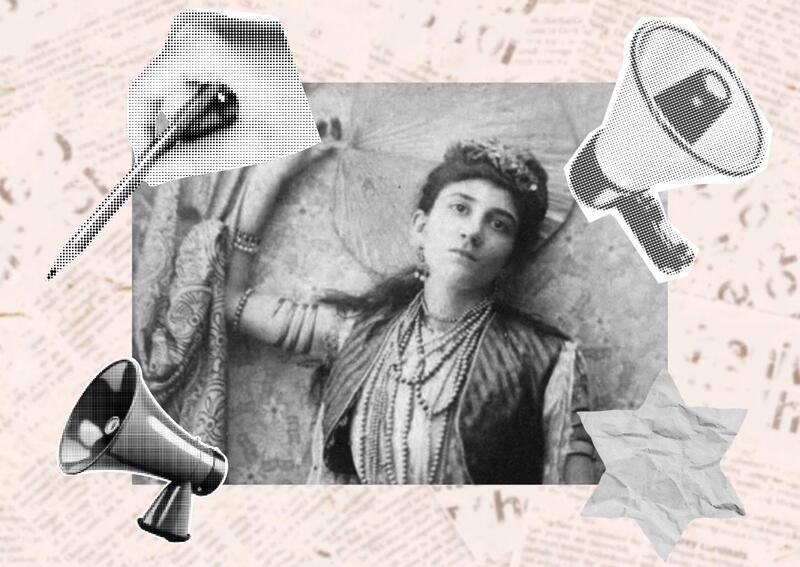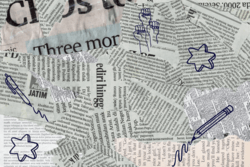A Catalyst for Change: The Power of Written Language and the Media
Whenever I hit “publish” on something I have written, I feel a release. This seemingly simple act of pressing a button on a computer is all at once cathartic and creative, refreshing and reassuring. I know that I put my whole self into my writing, that just maybe, what I just published will have a broad impact. A lot can be said about the power of written language. It is how we communicate with each other and share our love, rage, and confusion. But most of all, it can be a catalyst for change.
Rachel Sassoon Beer is a remarkable example of the impact of written language. Born in India in 1858 to the influential Sassoon family (part of the Baghdadi Jewish community), Beer moved to England with her family when she was young. In her teenage years and early 20s, she was an accomplished musical composer and a volunteer nurse. In 1887, she married Frederick Arthur Beer, who owned an English weekly newspaper called The Observer that Beer contributed to. She was soon made editor of the paper, making her the first female editor of a national newspaper. In 1893, she also obtained the Sunday Times. Through both papers, Beer published various articles and editorials, sharing her thoughts on current events and politics with her readers.
Her involvement with the Dreyfus Affair demonstrates her wide influence. In 1898, Beer wrote multiple articles expressing her beliefs and sharing information about the Dreyfus Affair. In this case, Alfred Dreyfus, an officer in the French military, had been falsely convicted of giving information to the Germans. It revealed deep-seated antisemitism in the French military and France in general.
After receiving a written confession from Ferdinand Esterhazy, the actual spy implicated in the affair, Beer wrote and published many articles in favor of a retrial of Dreyfus and against the French military’s antisemitism. Dreyfus eventually received a retrial and was found guilty again, but the French president pardoned him in 1899. The retrial was partially a result of Beer’s determined advocacy to prove Dreyfus’s innocence.
I find Beer’s advocacy via writing in the press inspiring. For me, the act of researching and writing an article provides a space for the author to think through complicated topics before educating others.
I have been involved with journalism since I was in fourth grade, when I started writing, editing, designing, and publishing a family newsletter with my younger brother. The newsletter, however family-oriented our mailing list may have been, provided a space for us to raise our voices and think through complex ideas. For example, as the COVID-19 pandemic evolved, we tracked our lives and changes to daily routines through what we wrote, publishing articles about what we thought of barriers in school, online classes, and masking policies.
Now, as an editor for my school newspaper, I have the opportunity to deepen my understanding of issues, as well as reach a broader audience. For example, when writing an article about the impact of ChatGPT on education, I was able to process my own conflicting views about the topic. Although I originally set out to write a neutral news article, my conversations with teachers highlighted the positive side of the topic, and I ended up writing an op-ed exploring the upsides of ChatGPT in education.
Many issues today are multifaceted and complicated. Even if I have a cohesive opinion on a matter, there are still aspects of the issue that may challenge my understanding. By writing articles, I am able to work through these nuances as I learn more about topics. Additionally, by having a deadline, I have a time constraint to actually produce a piece that showcases all of the facts or in the case of op-eds, highlights a concise opinion.
During Beer’s life, newspapers were the most extensive method of sharing news and information. Today, however, we are lucky to live in an age with a plethora of media available to learn more about issues and subsequently share our own outlooks. Activists today use platforms such as social media, blogs, and podcasts to reach as large an audience as possible. Social media can inspire civic participation and promote education, providing free resources for people to learn about all kinds of topics.
Since social media is a global community, users have access to the points of view of millions of people around the world. We have the ability to learn about issues impacting the population of a country halfway around the world. This within itself is powerful, but what we can do with it is even more so. Entire protests have been organized through social media, and social movements can become viral overnight as millions repost their message.
However, social media can be a tricky place when it comes to activism as it can have some pitfalls as a place for activism. As some movements get more attention, others may be overlooked. Additionally, the act of posting about conflict or activism can be thorny, as social movements become trends rather than real events that impact people’s lives, and users may feel pressured to express their opinions on issues. This can become a problem if it causes the spread of incorrect information or if people feel as if they must speak out at risk of being canceled.
Nonetheless, the power to instantly publish information online should not be taken for granted. As we go through our fast-paced lives, it is important to consider those who paved the way for us to assert our ideas in public discourse.
Beer is an exceptional example of the value of activism through media, as she built a massive platform at a time when many women were unable to voice their opinions. We can take inspiration from her bravery to defy social norms. The internet presents opportunities for more people than ever to be activists, both through journalism and informational posts, and we should all use it to educate ourselves and others on important topics.
This piece was written as part of JWA’s Rising Voices Fellowship.








A fine, thoughtful and thought-provoking article